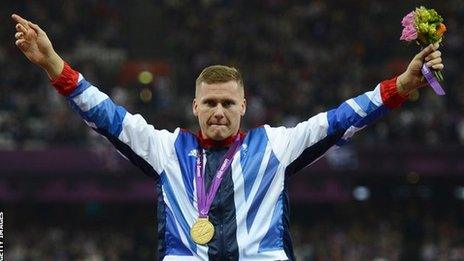European paracanoe champion Anne Dickins' amazing story
- Published
Paracanoe champ Dickins targets gold
During the course of covering Paralympic sport, you get to hear about an awful lot of dramatic, life-altering accidents.
Car crashes, collisions with trains, exploding bombs. Not so many stories about someone bending down to put on a shoe.
"Most people are disappointed when I tell them how it all happened," says British paracanoeist Anne Dickins, who will defend her title at the Canoe Sprint European Championships in Brandenburg this weekend.
"Before my injury, I was an endurance mountain biker and it all started when I fell asleep during a pairs 24-hour race in 2011.
"While my partner was out doing a few laps I lay down, with my pump and multi-tool still in my back pocket.
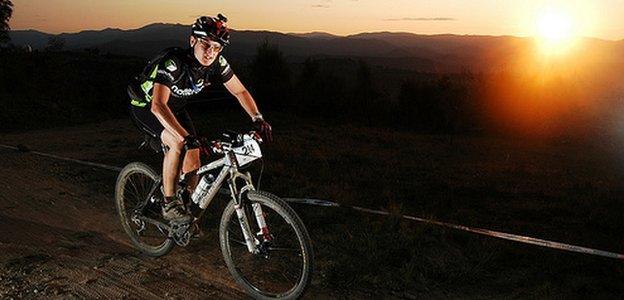
Dickins was an endurance mountain bike racer before sustaining her back injury in 2011
"Having to wake up in a hurry with a stiff back and continue racing caused my back to stiffen up more. I then went on holiday and fell off a windsurfer, before going on a cycling training camp, by which time my back was so stiff I could hardly move. But the final straw was putting on a shoe."
It sounds absurd. You might be tempted to laugh. Until you discover that Dickins had ruptured a disc in her back, injured nerves in her leg and required emergency surgery to relieve the pressure that was causing a rare complication called cauda equina, which can lead to loss of sensation and incontinence.
Dickins, a physiotherapist by trade, knew the situation could be life-changing. But she also knew that through willpower and hard work, people get better.
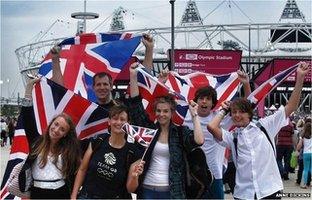
Dickins was a Games Maker at the 2012 Olympics in London - a life-changing event
"I was really hopeful that these nerves would recover," says the 47-year-old Dickins, who is from Surrey and is mum to two teenage children. "I desperately wanted my old life back.
"I was really weak for ages, I struggled to stand or sit for more than 20 minutes. I couldn't even lift an empty dinner plate. After six weeks, I could sit on my bike for about a minute. Six months later, I could walk, although I had to concentrate really hard not to fall over, much to the amusement of my kids!
"I tried to ride my bike, but my right leg just wasn't responding the same as my left leg and I kept falling off and hurting my back again. I became very low. As far as I was concerned, my life had stopped.
"It was soul-destroying. A sport for me isn't just about the competition, it's a way of life. All my friends, my social life, everything I did was about cycling. Suddenly I didn't have that any more.
"It was only when Simon, my partner, sat me down, stared me straight in the eye, and said 'how are you going to get yourself out of this dark place?' that I realised I was being a total nightmare and I had to make some changes."
A year after suffering the injury, Dickins started to volunteer as a physio at cycling meetings and landed a role at the velodrome at London 2012, where she watched Great Britain win seven gold medals.
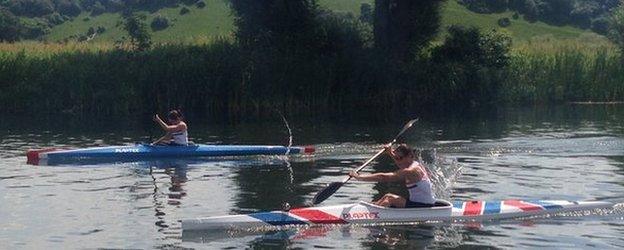
Dickins was European champion and world silver medallist within a year of taking up the sport
But it was away from the cycling track, and because of a chance meeting in a Stratford coffee shop, that her life started to become whole again.
"I just happened to be early for work one day, popped into a coffee shop and started chatting to this guy, because we were both wearing Games Maker uniforms," says Dickins.
"It turned out to be Colin Radmore, a former British slalom canoeist who was now a GB paracanoe coach. He told me that paracanoe was debuting at Rio in 2016 and that they were putting a team together.
"As kind of a joke, I said: 'Oh, you can have me if you want.' He put his coffee and his doughnut down, looked at me intently and grilled me for about half an hour on my injury. Then he went off and did his job and I went off and did mine.
"I remember sitting in the velodrome that day thinking: 'This is really odd, I think I've just been invited to try out for paracanoe.' I'd never even been in a canoe."
When Dickins told her family she was going to try out for the GB paracanoe team, they assumed it was as a physio. When she rocked up and completed some tests, the coaches told her to come back for the GB trials seven weeks later.
"I rang up my local kayak club and said: 'Look, this is going to sound really weird, but I can't canoe and I really want to be on the GB squad in seven weeks' time - can you help me?'" says Dickins.
"If that had been me taking that call I would have laughed and said: 'What a nutter.' But God bless this guy, he rang me back and said: 'Great, come down, we'll support you in getting onto the GB squad if that's what you want to do.'"
At the trials, Dickins posted the fastest time for a woman and was selected for the European Championships in Portugal, where she won a gold medal. Two months later - and only 10 months after sitting in a canoe for the first time - she won a silver medal at the World Championships in Germany.
It makes you wonder how many more life-bending chats took place by chance in Stratford that wonderful summer. If only Londoners were more open more often, the possibilities for personal improvement might be endless.
But competing as a paracanoeist meant having to swallow an unpalatable truth. Having spent so many months trying to convince herself that her body would heal eventually, Dickins now had to accept that she was permanently disabled.
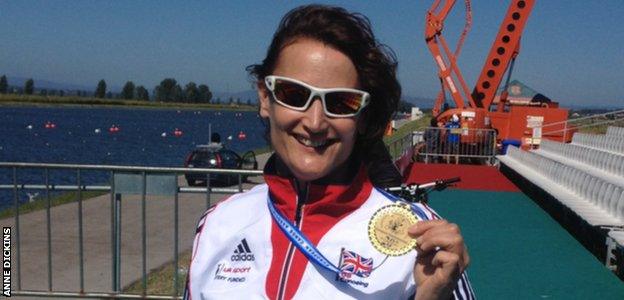
Dickins' life changed after a chance meeting with a GB paracanoe coach in a coffee shop
"Seeing it on a certificate in black and white - 'this is your permanent disability' - was good and bad at the same time," says Dickins. "I could see why I needed it but I really, really didn't want it.
"As a physio, I try to make things better and I couldn't. It wasn't a nice feeling but I really wanted to paddle so I was happy to go through with it.
"When you are fixed on a certain journey, if that journey goes wrong it is easy to get lost. But another way of looking at it is this: if you have no map, you can end up having an adventure that can end up leading anywhere.
"I was just chugging on in the same direction and getting nowhere. It really felt like I was banging my head against a brick wall. So I was really incredibly grateful to find something else.
"I would never have made that transition on my own, but it's great to have been given that chance to do something different."
You might call it the story of the sleep, the shoe, the coffee and the donut. From such mundane threads such wonderful stories can be spun.
- Published30 August 2013
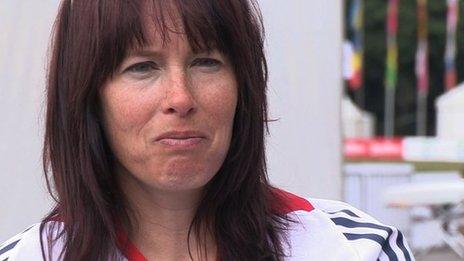
- Published18 December 2012
